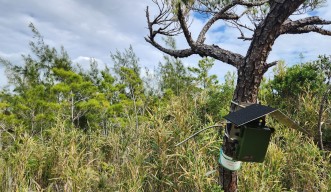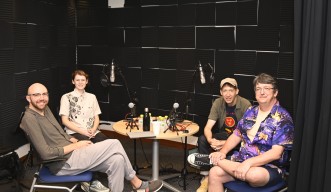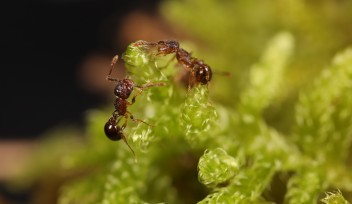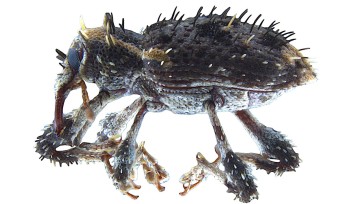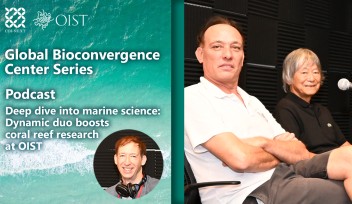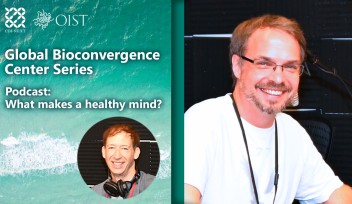What listening to birds can teach us about our ecosystems

At OIST the Global Bioconvergence Center of Innovation is promoting mental, physical, and environmental health to contribute to the efforts in establishing more sustainable societies around the globe. The center’s work is thereby implementing the “One World, One Health” approach, an idea based on the thought that the health of people is tied to the health of animals and the environment. Based on this principle, scientists and members of the public work together to find sustainable solutions for current problems.
In this second podcast episode of OIST’s “Global Bioconvergence Center” series DJ Nick Luscombe meets with researchers involved in the Okinawa Environmental Observatory Network (OKEON), which tackles the important tasks of measuring ecological traits and recording the composition of the island’s wildlife over long time periods.
The OKEON project has 24 field sites on Okinawa’s main island and uses insect traps, weather monitoring, as well as audio recordings and cameras to compile detailed data on the ecosystems in Okinawa. This allows the researchers to measure how animals are affected by climate change and other disturbances, such as typhoons. The data also helps to discover unknown environmental patterns that only become visible over a long period of time.
For this research, the Ryukyu islands are a particularly interesting study site – with unique compositions of endemic and invasive species varying from island to island and a strong gradient from the urban south to the rural north on Okinawa’s main island – making these islands ideal for studying biodiversity processes and dynamics in island chains.
In this episode DJ Nick talks to three researchers involved in the OKEON project:
-
Dan Warren, Section Leader of the Environmental Science and Informatics Section.
-
Cassondra George, Research Assistant who works on OKEON’s acoustic monitoring system.
-
Sam Ross, Postdoctoral Scholar in the Integrative Community Ecology Unit where he studies ecosystem resilience and soundscapes.
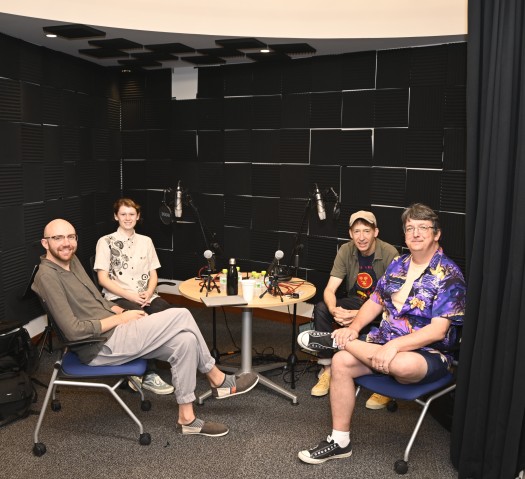
“Ecology is notorious for not having many general laws,” says Dr. Ross, explaining that observations often change when the scale at which you are observing them changes. Here, OKEON with its large-scale measurements, can fill important gaps. For example, when Typhoon Trami hit Okinawa in September 2018, acoustic measurements tracked the changes in bird communities before, during and after the storm. Looking at each study site on its own did not show any remarkable results, but when looking at the data from the entire island, the researchers found interesting patterns.
Studying such large-scale environmental patterns requires a wide network of study sites and produces immense amounts of data. At the 24 OKEON field sites on Okinawa, a device records every 10 minutes all sounds in the area for one minute at a stretch.
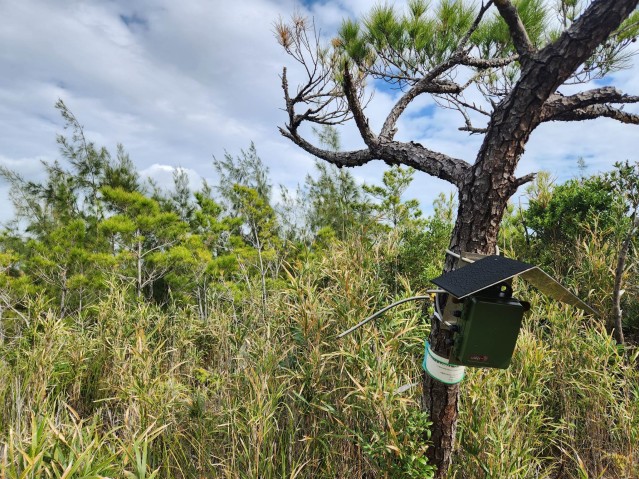
Undeniably, a project of this scale depends on the support of the local population and governments. Connecting with the community is an integral part of the OKEON project. “It is part of why we exist and how we exist,” emphasizes Dr. Warren. OKEON’s data, often shared directly with government offices as a service, helps monitor the invasive mongoose and is used in outreach projects, enriching children’s understanding of Okinawa’s diverse wildlife.
In return, the expertise of the local population often helps to better understand the collected data. “At the moment we are trying to build a program, based on machine learning, that can identify bird calls for us, but to do that we have to create a basis for the program to learn from," Cassondra George says. To build this database, Cassondra George is listening to thousands of bird song recordings to identify the different species. A process that is not only time-consuming but also very challenging. When coming across an unknown bird song, consulting with experts from the local communities here in Okinawa often helps to solve the puzzle.
The Global Bioconvergence Center of Innovation is operating with the support of the Japan Science and Technology Agency (JST)'s Program on Open Innovation Platform for Academia-Industry Co-Creation (COI-NEXT).
Specialties
Research Unit
For press enquiries:
Press Inquiry Form










